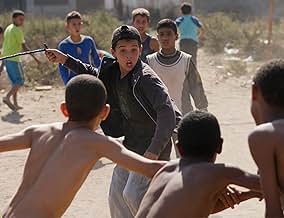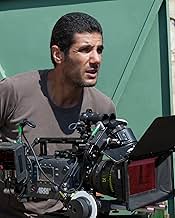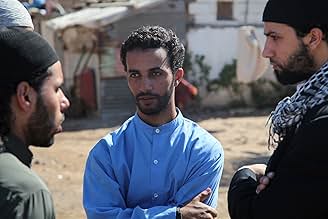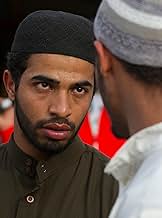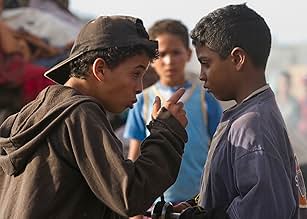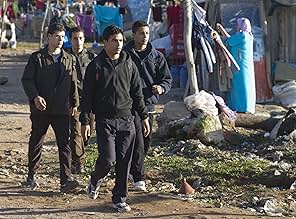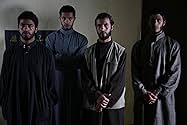VALUTAZIONE IMDb
7,3/10
2144
LA TUA VALUTAZIONE
Aggiungi una trama nella tua linguaA fictional account of the lives of the men responsible for the suicide bombings in Casablanca in 2003.A fictional account of the lives of the men responsible for the suicide bombings in Casablanca in 2003.A fictional account of the lives of the men responsible for the suicide bombings in Casablanca in 2003.
- Regia
- Sceneggiatura
- Star
- Premi
- 10 vittorie e 5 candidature totali
Abdelhakim Rachid
- Yachine
- (as Abdelhakim Rachi)
- …
Rabii Benjhail Tadlaoui
- Zaid
- (as Rabii Tadlaoui)
Recensioni in evidenza
The terrorist bombings in the Moroccan city of Casablanca didn't get as much attention as those in New York, London or Madrid. The five attacks were aimed at western and Jewish targets, killed 45 people, and were carried out by Moroccans, all of them young men from Sidi Moumen, a nearby slum. The attacks came as a shock, because for an Arab country, Morocco is considered rather moderate and open-minded. So why did these young terrorists carry out such gruesome attacks in their own city?
The film 'Le chevaux de Dieu' (God's Horses) tries to answer that question, and does it in an impressive way. For the most part, the film shows the daily life of young men in the slums. It is a cruel environment, an urban jungle full of violence, drugs, alcohol, corruption and extortion. And above all: without any hope. It is this desperate life that provides the fertile ground for frustration and rebellion.
The film shows clearly that the young men at no point deliberately choose for Muslim fundamentalism. One of them is arrested for throwing a stone to a police car and returns from prison as a faithful Muslim. Another kills his boss to prevent a rape, and is told by the religious community that God forgives him, provided that he starts praying and believing in Allah.
For the young slum dwellers, faith and religion is a tempting way of life. It preaches forgiveness, whereas the slum is full of violence. It is clear and deliberate, not chaotic like slum life. Its most important feature is discipline, which is in stark contrast with the loose morals in the slum dwellings.
The young men are fascinated by the Muslim organization. Slowly their lives are getting controlled by it. When the leader tells them they are selected for a special assignment, they feel honoured. Even when it becomes clear what this assignment is, most of them don't hesitate for a second.
The film doesn't approve of Muslim fundamentalism in any way. It merely shows the mechanics of it. That's why it is such a good movie. Watching the young men being absorbed by their religion, you almost pity them. But most of all, you understand why they do what they do. That's more than most other post-9/11 films have accomplished.
Moreover, the acting is incredibly subtle, and the cinematography is so effective that, at the end of the film you think you know the Sidi Moumen neighbourhood really well. When you go watch the movie, pay attention to the last shot; it is a beauty. In an amazing traveling shot, the camera circles around a group of kids playing football in the slums and watching the fatal explosion in the distance. Then, without cutting, the camera pans towards a cliff, we see the ball falling down and disappearing in the darkness. 'Le chevaux de Dieu' is a gem, and it would be a pity if it stays unnoticed by western audiences.
The film 'Le chevaux de Dieu' (God's Horses) tries to answer that question, and does it in an impressive way. For the most part, the film shows the daily life of young men in the slums. It is a cruel environment, an urban jungle full of violence, drugs, alcohol, corruption and extortion. And above all: without any hope. It is this desperate life that provides the fertile ground for frustration and rebellion.
The film shows clearly that the young men at no point deliberately choose for Muslim fundamentalism. One of them is arrested for throwing a stone to a police car and returns from prison as a faithful Muslim. Another kills his boss to prevent a rape, and is told by the religious community that God forgives him, provided that he starts praying and believing in Allah.
For the young slum dwellers, faith and religion is a tempting way of life. It preaches forgiveness, whereas the slum is full of violence. It is clear and deliberate, not chaotic like slum life. Its most important feature is discipline, which is in stark contrast with the loose morals in the slum dwellings.
The young men are fascinated by the Muslim organization. Slowly their lives are getting controlled by it. When the leader tells them they are selected for a special assignment, they feel honoured. Even when it becomes clear what this assignment is, most of them don't hesitate for a second.
The film doesn't approve of Muslim fundamentalism in any way. It merely shows the mechanics of it. That's why it is such a good movie. Watching the young men being absorbed by their religion, you almost pity them. But most of all, you understand why they do what they do. That's more than most other post-9/11 films have accomplished.
Moreover, the acting is incredibly subtle, and the cinematography is so effective that, at the end of the film you think you know the Sidi Moumen neighbourhood really well. When you go watch the movie, pay attention to the last shot; it is a beauty. In an amazing traveling shot, the camera circles around a group of kids playing football in the slums and watching the fatal explosion in the distance. Then, without cutting, the camera pans towards a cliff, we see the ball falling down and disappearing in the darkness. 'Le chevaux de Dieu' is a gem, and it would be a pity if it stays unnoticed by western audiences.
Based on the real multiple bombings that took place on May 16, 2003 in Casablanca, Morocco, the film follows its main characters over a period of 10 years, as they transition from boys to young men.
There's a lot that's powerful here, and there is much that has the ring of truth in this journey into darkness. But compared to (for example), Hany Abu-Assad's more complex and richer 'Paradise Now' there's also something a bit schematic. The reasons behind the transformation of these once sweet young men into bombers– poverty, hopelessness, an overly macho culture – are certainly true, but they're also familiar. It doesn't quite feel like we're digging deeper into their souls.
I also wish the villains of the piece, both Jihadist and 'civilian' were a little less on-the-nose, a little less mustache twirling. In terms of those men who are recruiting the boys, I missed the charisma that I assume must be part of the recruitment process.
Much like Ayouch's earlier 'Ali Zoaua: Price of the Streets', also about middle -eastern street kids, while the film is intelligent and interesting, it feels like it should be even more emotionally devastating than it ultimately is. That said, it's good enough that I could imagine re-visiting it, and seeing if it pulls me in even deeper on a second viewing.
There's a lot that's powerful here, and there is much that has the ring of truth in this journey into darkness. But compared to (for example), Hany Abu-Assad's more complex and richer 'Paradise Now' there's also something a bit schematic. The reasons behind the transformation of these once sweet young men into bombers– poverty, hopelessness, an overly macho culture – are certainly true, but they're also familiar. It doesn't quite feel like we're digging deeper into their souls.
I also wish the villains of the piece, both Jihadist and 'civilian' were a little less on-the-nose, a little less mustache twirling. In terms of those men who are recruiting the boys, I missed the charisma that I assume must be part of the recruitment process.
Much like Ayouch's earlier 'Ali Zoaua: Price of the Streets', also about middle -eastern street kids, while the film is intelligent and interesting, it feels like it should be even more emotionally devastating than it ultimately is. That said, it's good enough that I could imagine re-visiting it, and seeing if it pulls me in even deeper on a second viewing.
On May 16, 2003, Morocco got "its" September 11. How naïve we were to think ourselves as untouchables, if anything the tragedy was a humbling lesson and Morocco's secret services could reinvent their methods in order to nip in the bud terrorist actions. Who needs to be as effective as the Mossad or Scotland Yard when any Moroccan can be a potential informant (an entire cell could be dismantled simply because the building's janitor found suspicious that one man living alone could buy so much bread at once). Anyway, the shock faded with time or switched to other cities such as Madrid in 2004 or London in 2005, what was left from the bombings were anecdotes such as "where were you when it happened?" "I thought it was fireworks".
Still, when I got a job and started enjoying Casablanca's nighttime, I often wondered what if it happened to me... I guess I'm lucky to never have been in the wrong place at the wrong time. But Nabil Ayouch's angle is interesting: adapting Mahi Binebine's "Stars of Sidi Moumen" novel, he exposes terrorists as those born in the wrong place at the wrong time. The place was Sidi Moumen, a Moroccan favela, the wrong time was the aftermath of September 11 that ignited a fire of anger in souls who kept their frustration for too long, and resentment is an excellent combustible.
His movie ends right before the explosion, because whatever happens after was a human tragedy written by statistics, Ayouch is digging deeper, within the psyche of a disillusioned unemployed kid, willing to kill and die. How he doesn't see his victims as innocent is the greatest trick extremism can operate on weak souls, but are their weakness to blame? Ayouch is interested in the human side of outcasts, humanity as vulnerability. In a way, terrorists are the first victims of terrorism. Ayouch doesn't side with them but in "Horses of God" he depicts a sort of life that was so hellish that only the existence of an afterlife for the 'righteous' ones could make it tolerable. People's opium.
The film opens with "City of God" (or Allah) vibes. Boys play football, Tarek aka Yachine is the goalkeeper. They could be my age, I was 12 in 1994. The colors are yellowish and bright, it's childhood, life... but what do they do for a living? Taking stuff from a dump (one of the biggest in the area) and then resell it. When Tarek and Nabil are teased by two kids for their closeness, Tarek's brother Habib come with an improvised chain-like weapon and bomb them with insults that would make an adult weep. Habib is the most resourceful and natural leader, his mother treats him like the man of the house. Indeed with one brother who's stuck to the same corner with an old transistor and a mentally challenged father, we gather that neither Habib or Tarek grew up with models to look up to.
In this time and place, if you didn't become a football player or got yourself on the other side of the Mediterranean sea, your only options were selling fruit or vegetables, being a mechanic or forgetting lost dreams through a certain Moroccan 'plant' to blend with tobacco. Tarek lacked prospects and his brother's magnetism but somehow manages to grow up as a reasonable (albeit irritable) man played by Abdelhakim Rachid, he's Nabil's best friend and is in love with one of the girls from the neighborhood.
Speaking of Nabil (Hamza Souidek), his family background consists of a mother who dances at weddings, which in Moroccan perception equals a prostitute. But never sugarcoating his material, in quite a gut-wrenching scene we see Nabil being abused by Habib... during the childhood part. I was perplex about that scene but I guess Ayouch wanted to show a certain reality about religious people: they have a shady past, some traumas or guilt-inducing factors to make up to. Many praying and dutiful Muslims I knew lead the kind of youths that make mine feel like priesthood.
Ultimately, Habib (Abdelilah Rachid) becomes a delinquent and ends up in jail after a police incident. Both Tarek and Nabil work as mechanic assistants and do quite well. In one of the film's most lighthearted scenes the two drive one of these popular Moroccan motorbikes to get to Rizlene. It's like the two friends riding their white horse in De Sica's "Shoeshine". But Tarek can't talk to her, she's chaperoned by her brother Fouad (Ahmed el-Idrissi Amrani) who'll eventually be part of the terrorist group. Things escalate at Habib's return. He's bearded, talks like a sect guru and the mother is so admirative of him she doesn't even notice the change. Tarek does and doesn't like it. But one incident gives the religious group the opportunity to 'get' them..
From his "Ali Zaoua" to "Much Loved", 'group power' has been a source of inspiration for Ayouch. Maybe that is the real clash of civilization, more than obscurantism vs modernity, it's about the group versus the individual: society encourages us to speak our voices, which Tarek does all along, until he just finds the so awaited inner peace in masculine bonding and collective prayers. But in an ironic twist, as the day of the attack approaches, it's Habib who got cold feet. It was interesting to have that particular insight, we tend to look at these criminals like brainwashed zombies, but how many wanted to leave but couldn't. As for Tarek, even the memory of Rizlene was swept off by the prospects of having plenty of them in the afterlife. Groups again.
"Horses of God" traces the uncompromising road toward that fateful night where kids playing football in Sidi Moumen "saw fireworks" in Casa. At that point, innocent people were dead... as for the terrorists, somehow they were dead already, their fates echoing that line from Alan Parker's "Mississippi Burning" I paraphrased in the title.
On May 16, it was Casablanca burning.
Still, when I got a job and started enjoying Casablanca's nighttime, I often wondered what if it happened to me... I guess I'm lucky to never have been in the wrong place at the wrong time. But Nabil Ayouch's angle is interesting: adapting Mahi Binebine's "Stars of Sidi Moumen" novel, he exposes terrorists as those born in the wrong place at the wrong time. The place was Sidi Moumen, a Moroccan favela, the wrong time was the aftermath of September 11 that ignited a fire of anger in souls who kept their frustration for too long, and resentment is an excellent combustible.
His movie ends right before the explosion, because whatever happens after was a human tragedy written by statistics, Ayouch is digging deeper, within the psyche of a disillusioned unemployed kid, willing to kill and die. How he doesn't see his victims as innocent is the greatest trick extremism can operate on weak souls, but are their weakness to blame? Ayouch is interested in the human side of outcasts, humanity as vulnerability. In a way, terrorists are the first victims of terrorism. Ayouch doesn't side with them but in "Horses of God" he depicts a sort of life that was so hellish that only the existence of an afterlife for the 'righteous' ones could make it tolerable. People's opium.
The film opens with "City of God" (or Allah) vibes. Boys play football, Tarek aka Yachine is the goalkeeper. They could be my age, I was 12 in 1994. The colors are yellowish and bright, it's childhood, life... but what do they do for a living? Taking stuff from a dump (one of the biggest in the area) and then resell it. When Tarek and Nabil are teased by two kids for their closeness, Tarek's brother Habib come with an improvised chain-like weapon and bomb them with insults that would make an adult weep. Habib is the most resourceful and natural leader, his mother treats him like the man of the house. Indeed with one brother who's stuck to the same corner with an old transistor and a mentally challenged father, we gather that neither Habib or Tarek grew up with models to look up to.
In this time and place, if you didn't become a football player or got yourself on the other side of the Mediterranean sea, your only options were selling fruit or vegetables, being a mechanic or forgetting lost dreams through a certain Moroccan 'plant' to blend with tobacco. Tarek lacked prospects and his brother's magnetism but somehow manages to grow up as a reasonable (albeit irritable) man played by Abdelhakim Rachid, he's Nabil's best friend and is in love with one of the girls from the neighborhood.
Speaking of Nabil (Hamza Souidek), his family background consists of a mother who dances at weddings, which in Moroccan perception equals a prostitute. But never sugarcoating his material, in quite a gut-wrenching scene we see Nabil being abused by Habib... during the childhood part. I was perplex about that scene but I guess Ayouch wanted to show a certain reality about religious people: they have a shady past, some traumas or guilt-inducing factors to make up to. Many praying and dutiful Muslims I knew lead the kind of youths that make mine feel like priesthood.
Ultimately, Habib (Abdelilah Rachid) becomes a delinquent and ends up in jail after a police incident. Both Tarek and Nabil work as mechanic assistants and do quite well. In one of the film's most lighthearted scenes the two drive one of these popular Moroccan motorbikes to get to Rizlene. It's like the two friends riding their white horse in De Sica's "Shoeshine". But Tarek can't talk to her, she's chaperoned by her brother Fouad (Ahmed el-Idrissi Amrani) who'll eventually be part of the terrorist group. Things escalate at Habib's return. He's bearded, talks like a sect guru and the mother is so admirative of him she doesn't even notice the change. Tarek does and doesn't like it. But one incident gives the religious group the opportunity to 'get' them..
From his "Ali Zaoua" to "Much Loved", 'group power' has been a source of inspiration for Ayouch. Maybe that is the real clash of civilization, more than obscurantism vs modernity, it's about the group versus the individual: society encourages us to speak our voices, which Tarek does all along, until he just finds the so awaited inner peace in masculine bonding and collective prayers. But in an ironic twist, as the day of the attack approaches, it's Habib who got cold feet. It was interesting to have that particular insight, we tend to look at these criminals like brainwashed zombies, but how many wanted to leave but couldn't. As for Tarek, even the memory of Rizlene was swept off by the prospects of having plenty of them in the afterlife. Groups again.
"Horses of God" traces the uncompromising road toward that fateful night where kids playing football in Sidi Moumen "saw fireworks" in Casa. At that point, innocent people were dead... as for the terrorists, somehow they were dead already, their fates echoing that line from Alan Parker's "Mississippi Burning" I paraphrased in the title.
On May 16, it was Casablanca burning.
This movie creates a back story about the people responsible for the terrorist attacks in Casablanca in the 2000s. Those are real events but the movie doesn't really deal with them per say.
The movie focuses on a rendition (best guess account) of the lives of the terrorists starting at early age and up until that fateful day. It is a movie that tries to explore life and hope and struggle. It aims to give a perspective behind the act. Movies like CITY OF GOD and TSOTSI did the same for criminals, while this one deals with terrorists essentially.
I loved the early parts of the movie, but as it progressed it became very obvious and predictable, outside of the real events that are well known. The things it used artistic vision for, those were completely see through and predictable, and that is a huge problem for any production. As viewers we have to put it through a litmus test and not give it a free pass because of the subject matter; a movie should stand on its own script regardless what it is about.
The story starts great, showing us the early life of the main protagonists i would say from around age 8, keeping in mind one brother is decently older than the other. Those growing up parts, are a great exploratory story, almost a documentary (made up one) on their own. Because the movie spans around 20 years a lot takes place, a lot changes, including the cast. Many movie years later we enter the part where we transition from that childhood story into adulthood story and the radicalization part of the movie. This is where things begin to bog down big time.
I have to say it feels like two different movies and i did not enjoy the second part. I felt that it was incomplete. I don't know, maybe the writers and producer were trying to thread carefully with the issue but watching this movie, i do not see the radicalization they wanted to show. It does not hit home. There is no energy behind it. If anything, i expected the movie to play out with the kids we saw become crime king pins; no really. That's how they set it up. The shift towards religion is not portrayed well. The scenes that we get are i'm sorry to have to say that, really low energy and acted out subpar. Monotone is a simple catch all summary. Now i understand something about inner peace and calm in the face of eventual suicide, but the motivation of becoming a "horse" is not shown here. They wanted to show the gradual path towards the final act, yet from first adult scene to credits, there is no change. They act the same, do the same. There is no curve. It just becomes it. Over and over the same thing scene after scene. Same scene content, different movie month. But there is nothing behind them to show escalation or real increase of commitment or anything at all really. The viewer eventually walks away with nothing gained on the subject as credits roll.
For a movie whose purpose was to tell us how bad life, hopelessness, poverty, corruption push people towards what they can find solace in (whether good or evil) it does not achieve this purpose. If anything from what it showed, those boys should have never become radicalized because the content they used was not there for that to occur. Again i understand it could be self censored for variety of reasons but still, how can you deliver half a movie that captivates the viewer with their earlier life and turn it into nothingness in arguably the vital parts?
To me they really couldn't put into script what they wanted to do here. I keep saying that i cannot tell if that is on purpose or due to faults but ultimately does it really matter? If you make a movie about such a subject, you have to have a very clear vision of how you will proceed at all stages. This is not a moral story or a judgement story either. The movie does not plant thoughts about right or wrong. It just makes an account of what they think happened based on the location and time the movie covers ( 1980s-2000s Marocco slums). They could have done so much more with that. The connection between childhood and adulthood is completely missing, the duality between family and friends is very shallow. There are few scenes that somewhat attempt to show the protagonists manifesting how they have changed on those around them, but they are so generic and completely arbitrary and reasonable for somebody in a muslim country they do not even stand out as events. I watched it twice and i just cannot find the radicalization process they wanted to show. They simply failed to cover that properly. This is why this movie feels so bland at the end.
As a last thought, one thing it did do, is it did cover how poor and low educated people are exploited by others for their purpose. That is the one thing it did deliver on properly. Which again is extremely generic and it applies to a lot of things in life and not exclusive to the situation in this movie. Every time i try to give the movie credit, i really cannot. The thing i just praised it for, i discounted it at the same time. And that is just the situation here. Once you press on the sensitive aspects, HORSES OF GOD has nothing to push back with.
7/10 only because of early story and captivating start.
The movie focuses on a rendition (best guess account) of the lives of the terrorists starting at early age and up until that fateful day. It is a movie that tries to explore life and hope and struggle. It aims to give a perspective behind the act. Movies like CITY OF GOD and TSOTSI did the same for criminals, while this one deals with terrorists essentially.
I loved the early parts of the movie, but as it progressed it became very obvious and predictable, outside of the real events that are well known. The things it used artistic vision for, those were completely see through and predictable, and that is a huge problem for any production. As viewers we have to put it through a litmus test and not give it a free pass because of the subject matter; a movie should stand on its own script regardless what it is about.
The story starts great, showing us the early life of the main protagonists i would say from around age 8, keeping in mind one brother is decently older than the other. Those growing up parts, are a great exploratory story, almost a documentary (made up one) on their own. Because the movie spans around 20 years a lot takes place, a lot changes, including the cast. Many movie years later we enter the part where we transition from that childhood story into adulthood story and the radicalization part of the movie. This is where things begin to bog down big time.
I have to say it feels like two different movies and i did not enjoy the second part. I felt that it was incomplete. I don't know, maybe the writers and producer were trying to thread carefully with the issue but watching this movie, i do not see the radicalization they wanted to show. It does not hit home. There is no energy behind it. If anything, i expected the movie to play out with the kids we saw become crime king pins; no really. That's how they set it up. The shift towards religion is not portrayed well. The scenes that we get are i'm sorry to have to say that, really low energy and acted out subpar. Monotone is a simple catch all summary. Now i understand something about inner peace and calm in the face of eventual suicide, but the motivation of becoming a "horse" is not shown here. They wanted to show the gradual path towards the final act, yet from first adult scene to credits, there is no change. They act the same, do the same. There is no curve. It just becomes it. Over and over the same thing scene after scene. Same scene content, different movie month. But there is nothing behind them to show escalation or real increase of commitment or anything at all really. The viewer eventually walks away with nothing gained on the subject as credits roll.
For a movie whose purpose was to tell us how bad life, hopelessness, poverty, corruption push people towards what they can find solace in (whether good or evil) it does not achieve this purpose. If anything from what it showed, those boys should have never become radicalized because the content they used was not there for that to occur. Again i understand it could be self censored for variety of reasons but still, how can you deliver half a movie that captivates the viewer with their earlier life and turn it into nothingness in arguably the vital parts?
To me they really couldn't put into script what they wanted to do here. I keep saying that i cannot tell if that is on purpose or due to faults but ultimately does it really matter? If you make a movie about such a subject, you have to have a very clear vision of how you will proceed at all stages. This is not a moral story or a judgement story either. The movie does not plant thoughts about right or wrong. It just makes an account of what they think happened based on the location and time the movie covers ( 1980s-2000s Marocco slums). They could have done so much more with that. The connection between childhood and adulthood is completely missing, the duality between family and friends is very shallow. There are few scenes that somewhat attempt to show the protagonists manifesting how they have changed on those around them, but they are so generic and completely arbitrary and reasonable for somebody in a muslim country they do not even stand out as events. I watched it twice and i just cannot find the radicalization process they wanted to show. They simply failed to cover that properly. This is why this movie feels so bland at the end.
As a last thought, one thing it did do, is it did cover how poor and low educated people are exploited by others for their purpose. That is the one thing it did deliver on properly. Which again is extremely generic and it applies to a lot of things in life and not exclusive to the situation in this movie. Every time i try to give the movie credit, i really cannot. The thing i just praised it for, i discounted it at the same time. And that is just the situation here. Once you press on the sensitive aspects, HORSES OF GOD has nothing to push back with.
7/10 only because of early story and captivating start.
A difficult film to review objectively because of the content. It was extremely well done whatever your reaction might be to the story that was told. For those open to the excellent message contained in this film, it would be well worthwhile to watch. To those who see the world solely in black & white, it may, unfortunately, further fuel their prejudices
The story begins with a group of boys born and raised in the squalor of a Moroccan slum. Their lives are shaped by poverty, exploitation within their own community, harassment by the police and indifference to their plight from the government. They develop into young men who have little hope for the future, who use & deal drugs, who get drunk and into fights, who commit crimes & have no hope of meaningful employment, who are harassed & exploited by the police, and who in some cases are put in prison.
At this point in the story some of the young men are rescued ( or further exploited, depending on your point of view) by a group of Muslim men. The young men become part of a community that support & care for one another, pray & receive religious instruction, stop their anti-social behavior, cease committing petty crimes and seem on the road to being model citizens.
But then their education goes beyond the fundamentals of Islam and they learn of the persecution of others of their faith around the world. They are trained in hand to hand combat and indoctrinated with the view that martyrdom for the faith and for the defense of their people is an honorable objective that will ensure their entry into paradise and provide comfort to their families in this life.
To western minds this would appear to be mindless extremism and sacrifice but to be fair virtually every nation and every ideology fights its battles with armies recruited from poor, under-educated young men who have few prospects for the good life experienced by those who want to use them to defend their comfortable status quo or who want them to sacrifice themselves for some cause from which they, the recruiters, would reap the rewards. Whether the exploiters glorify the prospect of an honorable death for king & country, for democracy, for democratic freedom or for religious survival, it amounts to the same thing attracting the disenfranchised through propaganda and short-term rewards to fight and die while those who reap the potential benefits stay out of harm's way.
The message of the film may help some to better understand the circumstances that inspire the recruitment of Islamic fundamentalists who are willing to become martyrs for their faith, but more generally it should open some eyes to the exploitation of marginalized, disaffected people for some "grand cause," whether it is supposedly to preserve a western capitalistic way of life (though certainly not a life enjoyed by most of those recruited) or to restore lost glory (as was twice the case in Germany) or supposedly at the behest of the semi-divine emperor of Japan or to defend the faith as in the crusades or Israeli conflicts and so on throughout history. Glorifying sacrifice from those who have little to lose, by those who have much to gain, is neither unique to Islamic fundamentalists nor to the 21st century. The conditions that produce the ready supply of recruits used to wage wars and terrorism are nothing new either.
Definitely a thought-provoking, well produced film.
The story begins with a group of boys born and raised in the squalor of a Moroccan slum. Their lives are shaped by poverty, exploitation within their own community, harassment by the police and indifference to their plight from the government. They develop into young men who have little hope for the future, who use & deal drugs, who get drunk and into fights, who commit crimes & have no hope of meaningful employment, who are harassed & exploited by the police, and who in some cases are put in prison.
At this point in the story some of the young men are rescued ( or further exploited, depending on your point of view) by a group of Muslim men. The young men become part of a community that support & care for one another, pray & receive religious instruction, stop their anti-social behavior, cease committing petty crimes and seem on the road to being model citizens.
But then their education goes beyond the fundamentals of Islam and they learn of the persecution of others of their faith around the world. They are trained in hand to hand combat and indoctrinated with the view that martyrdom for the faith and for the defense of their people is an honorable objective that will ensure their entry into paradise and provide comfort to their families in this life.
To western minds this would appear to be mindless extremism and sacrifice but to be fair virtually every nation and every ideology fights its battles with armies recruited from poor, under-educated young men who have few prospects for the good life experienced by those who want to use them to defend their comfortable status quo or who want them to sacrifice themselves for some cause from which they, the recruiters, would reap the rewards. Whether the exploiters glorify the prospect of an honorable death for king & country, for democracy, for democratic freedom or for religious survival, it amounts to the same thing attracting the disenfranchised through propaganda and short-term rewards to fight and die while those who reap the potential benefits stay out of harm's way.
The message of the film may help some to better understand the circumstances that inspire the recruitment of Islamic fundamentalists who are willing to become martyrs for their faith, but more generally it should open some eyes to the exploitation of marginalized, disaffected people for some "grand cause," whether it is supposedly to preserve a western capitalistic way of life (though certainly not a life enjoyed by most of those recruited) or to restore lost glory (as was twice the case in Germany) or supposedly at the behest of the semi-divine emperor of Japan or to defend the faith as in the crusades or Israeli conflicts and so on throughout history. Glorifying sacrifice from those who have little to lose, by those who have much to gain, is neither unique to Islamic fundamentalists nor to the 21st century. The conditions that produce the ready supply of recruits used to wage wars and terrorism are nothing new either.
Definitely a thought-provoking, well produced film.
Lo sapevi?
- QuizOfficial submission of Morocco to the Oscars 2014 best foreign language film category.
- Colonne sonoreGouli je t'aime
by Youmni Rabii & City 16
Lyricst & Composer - Youmni Abdellatif
Les chevaux de Dieu (Bande originale du film)
©Les Films du Nouveau Monde, 2013
I più visti
Accedi per valutare e creare un elenco di titoli salvati per ottenere consigli personalizzati
- How long is Horses of God?Powered by Alexa
Dettagli
Botteghino
- Budget
- 3.000.000 USD (previsto)
- Lordo Stati Uniti e Canada
- 14.817 USD
- Fine settimana di apertura Stati Uniti e Canada
- 2251 USD
- 18 mag 2014
- Lordo in tutto il mondo
- 96.277 USD
- Tempo di esecuzione
- 1h 55min(115 min)
- Colore
- Mix di suoni
- Proporzioni
- 1.85 : 1
Contribuisci a questa pagina
Suggerisci una modifica o aggiungi i contenuti mancanti


